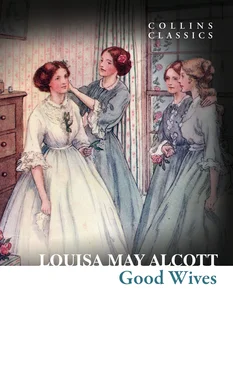The title Little Women has been interpreted in two ways. Firstly, as an expression of the relative unimportance of women in comparison to men in 19th-century America. Secondly, the title is often read as a statement about the general lack of significance of most people in society. It seems likely that the title encompasses both meanings: i.e. that women, and especially those of mediocrity, possess a diminutive presence.
The Character of Josephine March
Alcott allegedly based the central character, Josephine March, on herself. She is the one with a furious temper, and acts as a device by which Alcott can vent her frustrations at the world’s unfairness to women. Like Alcott, Josephine is something of a tomboy and therefore cannot appreciate why society draws a distinction between the genders. As far as she is concerned, women can do anything men can do.
The author’s intention was to make Josephine the perpetual spinster due to her feminist views, but rather ironically, she ended up marrying her off to keep her readership happy, such was society’s desire to see her conform to norms. Josephine struggles throughout the book with the parameters of womanhood. She wishes to take up arms during the Civil War and she wishes to attend college, but both ambitions are denied to her. Most of all she is vexed by other people’s expectation of her to mellow her extreme views and find a protective husband. Inevitably this makes her ever more bristly. Little Women was followed by two sequel volumes that took the life of Josephine into middle age. She becomes the governess of a school where she finds her maternal instinct by teaching and caring for her charges.
In some ways the overall story demonstrates how a strong-willed personality can initially baulk at convention, but eventually capitulate once they realize that they are affecting no one but themselves. It’s likely in the modern world that Josephine would be described as ‘high maintenance’ for her initial efforts at resisting expectations, but instead of becoming the neurotic spinster, she finds a way to contain herself by using her teaching as a vehicle to express her views. Her husband, who runs the school with her, is able to tolerate her idiosyncrasies because he is an intellectual and finds her intelligence attractive.
Good Wives
Good Wives , the sequel to Little Women that begins three years after the first novel ends, was published in 1869, just a year after Little Women . The two are sometimes published together in a single volume, forming part of The Little Women Trilogy that also includes Jo’s Boys as its third title.
In Good Wives , Alcott describes the journey from adolescence to adulthood as experienced by the four March sisters. Despite their disparate personalities, she extolls the virtues of inherent goodness, kindness, tolerance and forgiveness – important Christian transcendentalist values. Alcott was also concerned with the compromise that women often had to make between pursuing their own ambitions and fulfilling their roles as daughters and wives. In many respects she was a pioneering feminist, communicating through her characters that ambition could be a female trait too. Hers was a pragmatic feminism, still ultimately valuing the love and contentment that marriage and family life bring above all else. Both Little Women and Good Wives are a complex web of relationships and in this regard read rather like an early soap opera, which would go some way to explaining the mass appeal and popularity of Alcott’s books.
The United States had different social and cultural concerns in the late-nineteenth century to those of Victorian England, since the nation had only recently recovered from a brutal civil war, where the libertarian values of the North had triumphed. Alcott was writing for an audience who were interested in the ethics and morals of the American population, and was among the vanguard of female writers from this time.
CONTENTS
Cover
Title Page
Copyright
History of Collins
Life & Times
Chapter 1: Gossip
Chapter 2: The First Wedding
Chapter 3: Artistic Attempts
Chapter 4: Literary Lessons
Chapter 5: Domestic Experiences
Chapter 6: Calls
Chapter 7: Consequences
Chapter 8: Our Foreign Correspondent
Chapter 9: Tender Troubles
Chapter 10: Jo’s Journal
Chapter 11: A Friend
Chapter 12: Heartache
Chapter 13: Beth’s Secret
Chapter 14: New Impressions
Chapter 15: On the Shelf
Chapter 16: Lazy Laurence
Chapter 17: The Valley of the Shadow
Chapter 18: Learning to Forget
Chapter 19: All Alone
Chapter 20: Surprises
Chapter 21: My Lord and Lady
Chapter 22: Daisy and Demi
Chapter 23: Under the Umbrella
Chapter 24: Harvest Time
Classic Literature: Words and Phrases
About the Publisher
In order that we may start afresh, and go to Meg’s wedding with free minds, it will be well to begin with a little gossip about the Marches. And here let me premise, that if any of the elders think there is too much “lovering” in the story, as I fear they may (I’m not afraid the young folks will make that objection), I can only say with Mrs. March, “What can you expect when I have four gay girls in the house, and a dashing young neighbor over the way?”
The three years that have passed have brought but few changes to the quiet family. The war is over, and Mr. March safely at home, busy with his books and the small parish which found in him a minister by nature as by grace,—a quiet, studious man, rich in the wisdom that is better than learning, the charity which calls all mankind “brother,” the piety that blossoms into character, making it august and lovely.
These attributes, in spite of poverty and the strict integrity which shut him out from the more worldly successes, attracted to him many admirable persons, as naturally as sweet herbs draw bees, and as naturally he gave them the honey into which fifty years of hard experience had distilled no bitter drop. Earnest young men found the grayheaded scholar as young at heart as they; thoughtful or troubled women instinctively brought their doubts and sorrows to him, sure of finding the gentlest sympathy, the wisest counsel; sinners told their sins to the pure-hearted old man, and were both rebuked and saved; gifted men found a companion in him; ambitious men caught glimpses of nobler ambitions than their own; and even worldlings confessed that his beliefs were beautiful and true, although “they wouldn’t pay.”
To outsiders, the five energetic women seemed to rule the house, and so they did in many things; but the quiet scholar, sitting among his books, was still the head of the family, the household conscience, anchor, and comforter; for to him the busy, anxious women always turned in troublous times, finding him, in the truest sense of those sacred words, husband and father.
The girls gave their hearts into their mother’s keeping, their souls into their father’s; and to both parents, who lived and labored so faithfully for them, they gave a love that grew with their growth, and bound them tenderly together by the sweetest tie which blesses life and outlives death.
Mrs. March is as brisk and cheery, though rather grayer, than when we saw her last, and just now so absorbed in Meg’s affairs that the hospitals and homes, still full of wounded “boys” and soldiers’ widows, decidedly miss the motherly missionary’s visits.
John Brooke did his duty manfully for a year, got wounded, was sent home, and not allowed to return. He received no stars or bars, but he deserved them, for he cheerfully risked all he had; and life and love are very precious when both are in full bloom. Perfectly resigned to his discharge, he devoted himself to getting well, preparing for business, and earning a home for Meg. With the good sense and sturdy independence that characterized him, he refused Mr. Laurence’s more generous offers, and accepted the place of book-keeper feeling better satisfied to begin with an honestly-earned salary than by running any risks with borrowed money.
Читать дальше












